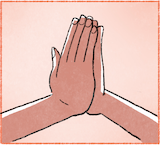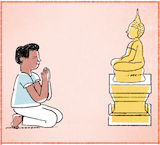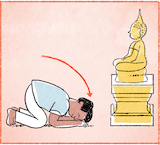


เขากำลังเฮ็ดหญังอยู่ เขากำลังพะนมมืออยู่
เป็นหญังเขาคือพะนมมือ บ่ฮู้คือกัน จักว่าเขาสิพะนมมือเฮ็ดหญัง จักว่าเขาสิไหว้พุใด จักสิไหว้น้าไหว้ลุง จักสิไหว้พ่อไหว้แม่ หลือไหว้พะกะบ่ฮู้ จักว่าเขาไหว้อยู่ใส เขาอาดสิญกมือขึ้นไหว้สิ่งสักสิด หลือไหว้อี่หยังกะได้ อันนี้กะบ่ฮู้คือกัน
9
เขากำลังเฮ็ดหญังอยู่ เขากำลังพะนมมืออยู่
เขากำลังสิไหว้พะ หลือกำลังสิไหว้พะพุดทะลูบนั้นหละ
เขาเฮ็ดมือจั่งใด เขากำลังพะนมมืออยู่ กำลังพะนมมือขึ้น ใซ้มือสองข้างพะนมขึ้น แนบกันสองข้างนั้นหละ
แล้วเขาหลับตาเฮ็ดหญัง อันนี้กะบ่ฮู้คือกัน จักว่าเขาหลับตาเฮ็ดหญัง เขาอาดสิอะทิดถาน หลือตั้งจิดอะทิดถานบางสิ่งบางอย่างกะได้ เพื่อที่สิขอพอนจากพะพุดทะลูบนี้ หลือขอพอนจากพะ หลือขอพอนจากสิ่งสักสิดทั้งหลาย
แล้วพุซายคนนี้เขานั่งจั่งใด เขานั่งทับส้น เขานั่งญกขาขึ้นแล้วกะทับส้น หลือนั่งท่าเทบพะบุดนั้นหละ เอิ้นง่ายๆ กะได้
10
เขากำลังเฮ็ดหญัง เขากำลังไหว้พะ หลือไหว้พะพุดทะลูบนั้นหละ
เป็นหญังเขาคือไหว้พะ อันนี้กะบ่ฮู้คือกัน เขาอาดสิมาไหว้พะขอพอน หลือมาเฮ็ดบุนกะได้ มื้อนี้อาดสิเป็นวันพะ หลือเป็นวันอี่หยังกะได้ที่เขามาทำบุนหลือมาไหว้พะ
แล้วพุซายคนนี้เขานั่งจั่งใด เขากำลังไหว้พะ ตอนแลกเขากะนั่งทับส้น หลือนั่งท่าเทบพะบุดนั้นหละ แล้วเขากะกำลังไหว้พะ แล้วตอนนี้เขากำลังก้มไหว้พะอยู่
Link to overview page
Link to dictionary
| Isaan | Pronunciation | Tones | Thai | English/Notes |
|---|---|---|---|---|
| เขา | khao | M | เขา | personal pronoun: he, she |
| กำลัง | gam-laŋ | M-HR | กำลัง | auxiliary indicating continuous or progressive action |
| เฮ็ด | het | H | ทำ | to do, to make |
| หญัง | ɲaŋ | M | อะไร, เป็นหญัง = ทำไม | 1. what {เขากำลังเฮ็ดหญัง = What is he doing?} {ธูปเอาไว้เฮ็ดหญัง = What are incense sticks for?} 2. something, anything, (nothing) 3. เป็นหญัง[...]คือ in initial position: why {เป็นหญังเขาคือใส่บักพิกลงไปในกวยเตียว = Why is he putting chili in [his] noodle soup?} {เป็นหญังหน้าต่างมันคือเปิด = Why is the window open?} {เป็นหญังมันคือมีควนไฟ = Why is there smoke?} |
| อยู่ | yu: | H | อยู่ | 1. to be (located) at 2. yet, still 3. auxiliary indicating continuous or progressive action {ทอดปาอยู่ในกะทะ = (in the process of) frying a fish in the pan} {แม่กำลังเมี้ยนเฮียนอยู่ = mother is cleaning/tidying up the house} |
| พะนม | pha-nom | H-HR | พนม | put the palms of the hands together in salute |
| มือ | mʉ: | HR | มือ | 1. hand 2. front leg/paw (e.g., of a cat) |
| เป็น | pen | M | เป็น | 1. to be, to exist 2. to be able to 3. to suffer, sth. happens to 4. เป็นหญัง[...]คือ in initial position: why? {เป็นหญังเขากะคือแปงฟัน = Why is he brushing his teeth?} {เป็นหญังเคี่ยงบินมันคือสิตก = Why is the airplane falling down?} |
| คือ | khʉ: | HR | คือ | 1. to be, to resemble, like, as 2. why {บักหล้าคือบ่เก็บโต่ะแน่ = [addressing a young boy] Why haven't you cleared the table?} |
| บ่ | bɔ: | H | ไม่ | 1. no, not 2. question particle, transforming a statement into a question Notes: spelling exception in line with common usage on social media |
| ฮู้ | hu: | HF | รู้ | 1. to know 2. to understand Notes: equivalent to ลู้ |
| คือกัน | khʉ:-gan | HR-M | เหมือนกัน | 1. also, likewise, similarly {ยินดีที่ได้ฮู้จักคือกันคับ = Nice to meet you too!} 2. in negative sentences: either {บ่ลู้คือกัน = I don't know either} {จักคือกัน = I don't know (either)} |
| จัก | jak | M | จัก | 1. answer to a question: [I] don't know, don't know exactly, [I'm] not sure {พุซายคนนี้เขาเถ้าไป่ จัก จักเถ้าหลือบ่เถ้า เบิ่งบ่ค่อยออก = Is this man here already old? I don't know. I can't see clearly whether he's old or not.} {เขาเว้ากันอยู่ใส จักคือกัน = Where are they talking? I don't know either.} 2. exact(ly), what exactly {จักต้มอี่หยังกะบ่ฮู้ = I don't know what (exactly) he is cooking} {บ่ลู้คือกันจักปาอี่หยัง = I don't know either what kind of fish this is} 3. how much/many? {ต้นไม้มีจักต้น = How many trees are there?} {ตอนนี้จักโมงแล้ว = What time is it now?} {มือของเฮานี้สิมีจักนิ้ว = How many fingers do our hands have?} 4. a bit, a little bit {จักหน่อย/จักหน่อยหนึ่ง = a bit, a little bit} |
| ว่า | wa: | H | ว่า | 1. that, as {คำว่า X = the word X} 2. to say |
| สิ | si | M | จะ | future tense auxiliary {เขากำลังสิตื่น = he's about to wake up} {สิไปตะหลาด = [I'm] going to the market} |
| ไหว้ | wai | LF | ไหว้ | to salute, to greet, to pay respect |
| พุใด | phu-dai | H-M | ใคร | 1. who {มีพุใดโทมากะบ่ลู้ = I don't know who has called} {ห้องนอนของพุใด = whose bedroom (is this)? } 2. someone, somebody, anybody, in negative context: nobody {บ่มีพุใดอยู่กับเขาเลย = there's nobody with him} |
| น้า | na: | HF | น้า | 1. uncle, aunt (maternal line, younger than mother) 2. used to address or refer to strangers older than oneself but likely to be younger than one's parents |
| ลุง | luŋ | HR | ลุง | 1. uncle (both paternal and maternal lines, older than parent) 2. used to address or refer to male strangers about the age of one's parents |
| พ่อ | phɔ: | H | พ่อ | father |
| แม่ | mɛ: | H | แม่ | mother |
| หลือ | lʉ: | M | หรือ | or |
| ไหว้พะ | wai-pha | LF-H | ไหว้พระ | to pay respect to the Buddha (or a Buddha image) |
| กะ | ga | M | ก็ | 1. then, consequently 2. also |
| ใส | sai | M | (ที่)ไหน | 1. where? {สิไปใส = Where are [you] going?} {มาแต่ใส = Where are [you] coming from?} {กะทะอยู่ใส = Where's the pan?} 2. somewhere, anywhere {ใสกะได้ = anywhere, wherever you like} |
| อาด | a:t | LF | อาจ | 1. might, may, will 2. likely |
| ญก | ɲok | H | ยก | 1. to raise {ญกมือขึ้น = to raise the hand} {ญกโตอย่าง = to give an example} 2. to lift {เขากำลังญกก้อนหินขึ้น = he's lifting up the stone} |
| ขึ้น | khʉn | LF | ขึ้น | 1. to go up, to increase 2. sun: to rise {ตะเว็นกำลังขึ้น = the sun is rising} 3. more 4. bus/train etc.: to get on, to board {พุโดยสานขึ้นลดไฟเบิดแล้ว = all passengers have boarded the train} |
| สิ่ง | siŋ | H | สิ่ง | thing, object |
| สักสิด | sak-sit | M-M | ศักดิ์สิทธิ์ | sacred, holy |
| อี่หยัง | i:-yaŋ | H-M | อะไร | 1. what {นี้คืออี่หยัง = What is this?} {มื้อนี้เจ้าเฮ็ดอี่หยัง = What are you doing today?} {กินเข้างายกับอี่หยัง = What did you have for breakfast?} 2. something, anything, (in negations) nothing {บ่ต้องเฮ็ดอี่หยังอีกเลยนอกจากใส่ปุย = [we] don't need to do anything besides adding fertilizer} |
| ได้ | dai | HF | ได้ | 1. can 2. to get, to obtain 3. before verb: indicating past tense 4. บ่ได้ + verb: not |
| อัน | an | M | อัน | 1. thing, object 2. general clf. for objects |
| นี้ | ni: | HF | นี้ | 1. this 2. here |
| พะพุดทะลูบ | pha-phut-tha-lu:p | H-H-H-HF | พระพุทธรูป | Buddha statue, Buddha image |
| นั้นหละ | nan-la | HF-M | นั่นแหละ | auxiliary for emphasis at the end of a phrase |
| จั่งใด | jaŋ-dai | H-M | ยังไง, แบบไหน | how, in what manner {บักนาวมันมีลดซาดจั่งใด = Lime fruits have what kind of taste?} {เขาปิดแอจั่งใด = How is he switching off the A/C?} {เทียนใซ้จั่งใด = How's a candle used?} {สิใซ้จั่งใด = how is [it] used?} |
| ใซ้ | sai | HF | ใช้ | to use |
| สอง | sɔ:ŋ | M | สอง | two |
| ข้าง | kha:ŋ | LF | ข้าง | 1. side {มีหูจับสองข้าง = there are handles on both sides} 2. next to {วางอยู่ข้างๆ ก่องใบใหญ่ = it's placed next to the large box} {เขายืนอยู่ข้างๆ อีกพุหนึ่ง = he's standing next to another person} 3. clf. for body parts which come in pairs (eyes, ears, legs etc.) {เขามีตาสองข้าง = she has two eyes} |
| แนบ | nɛ:p | HF | แนบ | to be close to, to attach |
| กัน | gan | M | กัน | mutual, each other, with another, together {เขากำลังนั่งเว้ากัน = they're sitting and talking} {เขาสองคนฮักกัน = they love each other} {ปาสองโตนี้ ใหญ่ห่างกันหลายบ่ = These two fish here, are they very different in size (from each other)?} {ต่างกัน = to be different (from each other)} {ก่องอันไหนหนักกว่ากัน = Which box is heavier (than the other(s))?} |
| แล้ว | lɛ:o | HF | แล้ว | 1. finished 2. already 3. and then, and next (especially แล้วกะ) 4. auxiliary for past tense |
| หลับ | lap | M | หลับ | 1. to sleep {นอนหลับ = to sleep (see separate entry)} 2. to close (the eyes) {หลับตา = to close one's eyes} |
| ตา | ta: | M | ตา | eye {เขามีตาสองข้าง = he's got two eyes} {หลับตา = to close one's eyes} |
| อะทิดถาน | a-thit-tha:n | M-H-M | อธิษฐาน | to pray |
| ตั้งจิด | taŋ-jit | HF-M | ตั้งจิต | to focus the mind |
| บางสิ่งบางอย่าง | ba:ŋ-siŋ-ba:ŋ-ya:ŋ | M-H-M-H | บางสิ่งบางอย่าง | something, anything |
| เพื่อที่ | phʉ:a-thi: | H-H | เพื่อที่ | in order to, so that Notes: the vowel เอือ is likely to be a Thai loan |
| ขอ | khɔ: | M | ขอ | 1. to ask for, to request 2. please |
| พอน | phɔ:n | HR | พร | blessing, good wishes |
| จาก | ja:k | LF | จาก | 1. from {... เฮ็ดมาจากอี่หยัง = ... is made from what?} 2. to depart |
| พะ | pha | H | พระ | monk |
| ทั้งหลาย | thaŋ-la:i | HF-M | ทั้งหลาย | various, every, all |
| พุซาย | phu-sa:i | H-HR | ผู้ชาย | man, male |
| คน | khon | HR | คน | person, people |
| นั่ง | naŋ | H | นั่ง | to sit |
| ทับ | thap | H | ทับ | 1. slash symbol '/' {สี่ทับหก = '4/6'} 2. to put on top (of), to be on top (of) {นั่งทับส้น = to sit on one's heels, e.g., for a prayer} |
| ส้น | son | LF | ส้น | heel |
| ขา | kha: | M | ขา | leg {ขาหน้า = front leg} {ขาหลัง = hind leg} {ส้งขาญาว = long trousers} |
| ท่าเทบพะบุด | tha:-the:p-pha-but | H-HF-H-M | ท่าเทพบุตร | prayer position with feet and knees on the ground, sitting on the heels |
| เอิ้น | ə:n | HF | พูด, เรียก | to call, to say {เอิ้นง่ายๆ ว่า = in other words} {คนอี่สานเอิ้นว่า เป็นลูกคนกก = Isaan people call her ลูกคนกก} |
| ง่าย | ŋa:i | H | ง่าย | easy, simple, clear |
| มา | ma: | HR | มา | 1. to come 2. auxiliary expressing action towards the present or focal time {กะคุเฮ็ดมาจากอี่หยัง = What is the bucket made of?} {แล้วเขากะเก็บเงินจากพุนั้นมา = and then she takes the money of that person} |
| เฮ็ดบุน | het-bun | H-M | ทำบุญ | to make merit, to do good Notes: see also ทำบุน |
| มื้อนี้ | mʉ:-ni: | HF-HF | วันนี้ | today |
| วันพะ | wan-pha | HR-H | วันพระ | Buddhist holy day |
| วัน | wan | HR | วัน | day Notes: used in names of days like Monday, Tuesday etc., otherwise มื้อ |
| ที่ | thi: | H | ที่ | 1. that, which {คนที่ยืนอยู่ฝั่งขวา = the person which is standing on the right = the person standing on the right} {เว้าคำที่บ่สุพาบ = to speak words which are impolite = to speak impolitely} 2. for ordinal numbers {ที่สาม = third} |
| ทำบุน | tham-bun | HR-M | ทำบุญ | to make merit, to do good Notes: see also เฮ็ดบุน |
| ตอน | tɔ:n | M | ตอน | when, period {ตอนสองโมงเซ้า = at 8 o'clock in the morning} {ในตอนกินเข้า = when eating} |
| แลก | lɛ:k | HF | แรก | first {ตอนแลก = at first} {พุซายคนแลก = the first man} {มื้อแลก = the first day} |
| ตอนนี้ | tɔ:n-ni: | M-HF | ตอนนี้ | now |
| ก้ม | gom | HF | ก้ม | to bend down, to stoop |